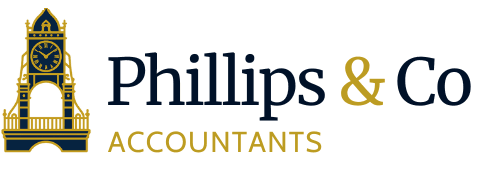Author: Phillips & Co Accountants, Chester
Date: 09 September, 2025
If you’re a sole trader and growth is coming fast, you’ve probably asked: “Should I go limited?” The answer depends on numbers, risk and goals. Here’s a clear, no-jargon guide so you can choose confidently.
Quick summary
Why go limited? Limited liability, potential take-home improvements, easier to reinvest profits, and a more corporate profile with customers and lenders.
Why stay sole trader? Simpler admin, fewer filings, sometimes better if profits are modest or income is variable.
Best approach: Ask us to model the two outcomes for your figures (including tax bands and admin cost) before you decide.
When going limited often helps
Consistent profits and you don’t need to draw every pound personally.
You want limited liability protection.
You plan to reinvest into stock, equipment or people.
You want to add shareholders (e.g., spouse) legitimately.
Clients expect a Ltd supplier.
When staying sole trader may be better
Profits are low or volatile and you need simplicity.
You’re testing a new idea and admin would slow you down.
You’re in personal service style work with one main client (we’ll review status/IR35 first).
Tax & admin: what actually changes
Limited company route
File statutory accounts to Companies House.
File a Corporation Tax return (CT600) to HMRC.
Pay Corporation Tax normally 9 months and 1 day after year-end; file the return within 12 months.
Confirmation statement annually (director/share changes, SIC, etc.).
If taking a salary: operate PAYE; dividends are from post-tax profits.
VAT: we review registration and the best scheme; we can transfer a registration where appropriate to keep continuity.
Sole trader route
Keep business records and file Self Assessment by 31 January (online).
Pay income tax, Class 2/4 NIC and, if applicable, payments on account in Jan/Jul.
VAT remains if you’re registered.
First-year timeline when you incorporate
Formation & structure: company set up, share structure agreed (e.g., ordinary shares for flexibility).
Register for Corporation Tax: within 3 months of starting to trade.
Bookkeeping/Xero: live bank feed, receipt capture, coding rules.
VAT: register or transfer (and review the scheme).
Personal extraction plan: salary/dividend mix that fits your cash needs and tax bands.
Year-end: we prepare accounts and CT600; you sign and we file.
Deadlines: CT payment 9m+1d after year-end; return within 12m; confirmation statement annually.
Moving assets & starting balances (what people forget)
Assets transferred (laptop, tools, stock) need sensible values; this can create a director’s loan account you can draw down tax-free later.
If you transfer a whole business for shares, incorporation relief may defer gains—worth discussing before you move.
Close off the sole-trader period cleanly (final Self Assessment covering pre-incorporation).
Risks & checks before you switch
IR35/personal service: if you’re effectively an employee of one client, a company may not save tax.
Associated companies can affect Corporation Tax bands.
Benefits/P11D: company-paid personal costs can create benefit-in-kind charges—use the right route.
Dividends: only from distributable profits (not cash in the bank).
What you’ll get with Phillips & Co (Accountants Chester)
A clear comparison: sole trader vs limited—your take-home, not a generic example.
Company formation, share structure, HMRC registrations, and your first-year calendar.
Accounts, Corporation Tax and Self Assessment handled on time.
Plain-English advice; fixed fees; no surprises.
Thinking about going limited? Let’s run the numbers and make a plan.
📞 01244 220 062
If you’d like expert guidance, contact Phillips & Co Accountants Chester today.
Keep More, Stress Less
Disclaimer
The information contained in this blog is for general guidance only. It does not constitute professional advice and should not be relied upon as such. Always seek tailored advice from a qualified accountant regarding your specific circumstances.
